AIG’s Mentoring Programs began in 2015 as an initiative of the National Graduate Committee to connect undergraduate students, MSc/PhD Candidates and early and career geoscientists with experienced geoscience professionals to seek practical advice, direction and feedback on their future careers.
In 2020 the AIG opened up the program to all members (with a good response) and will now accept mature geoscientists (> 5years) into the program as mentees. These more mature members may be seeking advice from senior geoscience professionals on a range of issues to further their careers, possibly involving a move to management or changing career direction to a different sector.
In 2020 the AIG waived all fees for the program as some elements of the program were compromised by Covid-19 issues. Once again in 2021 all fees have been waived for the programs so participation is free.
Satisfactory completion of the program (attending formal events where possible and regular communication between pairings) will earn each Student Mentee a $50 voucher towards the cost of attending an AIG CPD event (workshop/symposium) of their choice.
Both Mentors and Mentees can claim CPD points for their participation in the programs. Further information on CPD points can be found here.
AIG Mentoring Programs are active in most States including a Distance Mentoring Program for remote and travelling geoscientists. The programs have formal, face-to-face events and allow programs which run over 5-6 months annually. Mentor-mentee contact is through private face to face, telephone or skype meetings as well as programmed formal meetings and social events. This allows time for the development of strong relationships between mentees and mentors and encourages networking with the general geoscience community.
Registration for the AIG Mentoring Programs in 2021 as a Mentee and as a Mentor is now open at https://www.aig.org.au/mentoring-program/
The closing date for registration as mentor or mentee is 31 March 2021 with programs commencing in late April/early May.
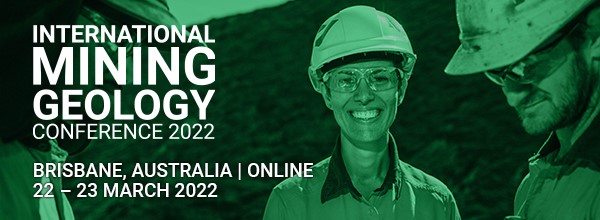
Just over one month remains to submit your abstract for the International Mining Geology Conference 2022.
Showcasing industry best practice, the conference will focus on maximising orebody value and driving productivity in mining geology. Attendees will have the opportunity to explore new techniques and emerging technologies providing new solutions to operations.
The conference is calling for abstracts on the following topics:
The committee are looking for abstracts that include case studies and demonstrate the value of new technologies and approaches.
Submissions close on 29 March 2021.
Follow this link for further information.
Key Dates:
3 May 2021: Notification to Authors
26 July 2021: Draft paper submission
29 November 2021: Final drafts due
22-23 March 2022: Conference dates
Funding is available through Women & Leadership Australia to support the development of female leaders across Australia’s Mining & Resources industry.
The initiative is providing women with grants of between $1,000 and $5,000 to enable participation in one of three leadership development courses designed for emerging through to senior leaders. The scholarship funding must be allocated by the end of March 2021.
Expressions of Interest:
Find out more and register your interest by completing the Expression of Interest form prior to 19th March via https://www.wla.edu.au/miningresources.html
Registrations are now open for the Territory’s premium exploration event, the Annual Geoscience Exploration Seminar (AGES).
AGES attracts and supports the exploration of the Northern Territory’s rich resources by providing state of the art geoscience information and data.
The event has been running for the past two decades. This year’s seminar will be held in Alice Springs after the 2020 event was cancelled due to coronavirus.
Anticipated to attract more than 200 delegates, the list of highlights include:
AGES is an important opportunity for the Northern Territory Government to showcase the latest geological results from the Northern Territory Geological Survey programs under the $26 million Resourcing the Territory initiative.
Register for AGES 2021 on the 20 and 21 April at the Alice Springs Convention Centre.
AIG has responded to recent changes to geoscience degree undergraduate curricula at some Australian universities by introducing educational requirements for institute membership.
Over the last two decades the AIG has observed a trend for several Australian universities to move away from offering geoscience courses in favour of broader earth science programs. In recent months this trend has accelerated, perhaps in part due to COVID related funding issues impacting most universities. At least two Australian universities no longer offer a geoscience major and several others are reducing the geoscience subjects offered to students.
The AIG has also noticed a reduction in the core geoscience subjects completed by many students graduating with geoscience degrees, which has resulted in an increasing number of graduates who have geoscience degrees but lack fundamental geoscience knowledge and skills, and as a result do not meet the knowledge and skills requirements of many potential employers.
Geoscience knowledge requirements for new membership applications have recently been implemented by the Institute. The objectives of this initiative are to ensure AIG members have core geoscience knowledge and competencies in order to facilitate best practice and to meet the key object of a professional body to maintain standards and ultimately protect the public.
The AIG will also consider applications from applicants who do not meet the geoscience requirements but have substantial relevant experience or other relevant education and training.
The recently introduced minimum knowledge requirements for AIG membership applications are:
Minimum Geoscience Subjects
Applicants to have completed an undergraduate degree with geoscience subjects contributing a minimum of 33% of the credit points required to complete the degree.
Minimum Geoscience Core Knowledge Subjects
Applicants must have completed Earth History / Principles of Geology or equivalent at Level 1 or above, Field Techniques at Level 2 or above, and at least four of the following subjects at Level 2 or above.
Applicants may also meet the minimum subject and knowledge requirements through completion of the subjects within a post-graduate course.
Post-graduation professional experience requirements for membership remain unchanged:
To be eligible for election as a Member, an applicant shall be a geoscientist having not less than five years experience in their Field(s) of Practice, such experience having been of a responsible nature and involving the exercise of independent judgment* during at least three of those years.
The measures are seen to be critical to ensuring that AIG members are able to achieve and maintain professional global mobility and meeting the increasing requirements to practice in most regulatory regimes. In addition, as Australian government bodies are increasingly requiring minimum standards for signatories on assessments, applications, reports, etc., AIG seeks to ensure that AIG members are well-placed as governments introduce requirements that constitute forms of professional licensing.
These new requirements are not retrospective and all new membership applicants will be covered by a “grandfathering period” ending 31 March 2025. After this date, the minimum core knowledge subjects will be required.
* Discretion and independent judgment
In general, the exercise of discretion and independent judgment involves the comparison and the evaluation of possible courses of conduct, and acting or making a decision after the various possibilities have been considered. The exercise of discretion and independent judgment must be more than the use of skill in applying well-established techniques, procedures or specific standards described in manuals or other sources.
The exercise of discretion and independent judgment implies that one has the authority to make an independent choice, free from immediate direction or supervision. However, discretion and independent judgment can be exercised even if the decision or recommendation is reviewed at a higher level. Thus, the term “discretion and independent judgment” does not require that the decisions being made have to be final or free from review.
The JORC Committee and JORC parent bodies (AIG, AusIMM and Minerals Council of Australia) are seeking a project manager to help progress the current JORC Code update. This is a key, full-time role, working with the AusIMM, MCA and AIG leadership to support and project-manage the review and deliver a set of reforms. The role will be a highly visible leadership role with significant engagement with external stakeholders, at various levels across the stakeholder groups. The position reports to AusIMM Chief Operating Officer, on behalf of the JORC parent bodies.
The update process is expected to continue for the next 2-3 years. This appointment will be for an initial period of 12 months with the potential for renewal.
Key responsibilities of the role include:
A copy of the position description is available by contacting Helen Milovanovic (hmilovanovic@ausimm.com).
Expressions of interest in the role should be received by Friday, 5th March, 2021.
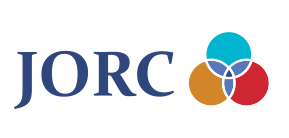
The Frank Arnott-Next Generation Explorers Award committee is very pleased to announce the six finalists for the first NGEA contest to be presented and judged at the PDAC convention early March.
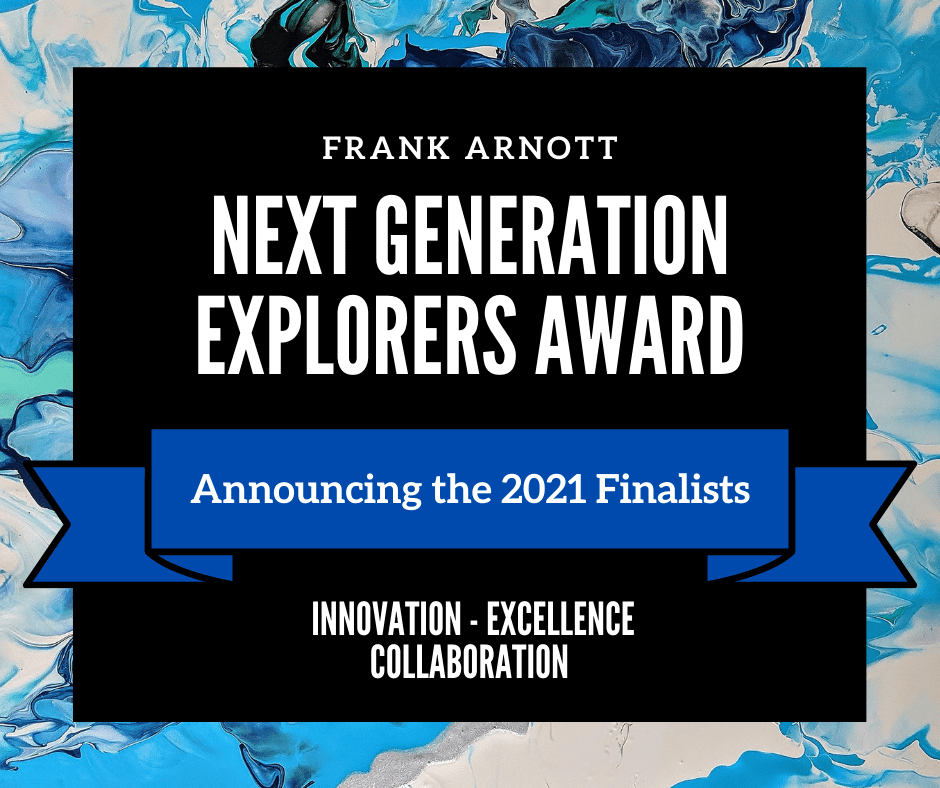
Nineteen teams submitted entries to this year’s Next Generation Explorers Award challenge, with our judges selecting six teams to advance to the finalist presentations at the Prospectors and Developers Association of Canada (PDAC) convention from March 8-11th, 2021.
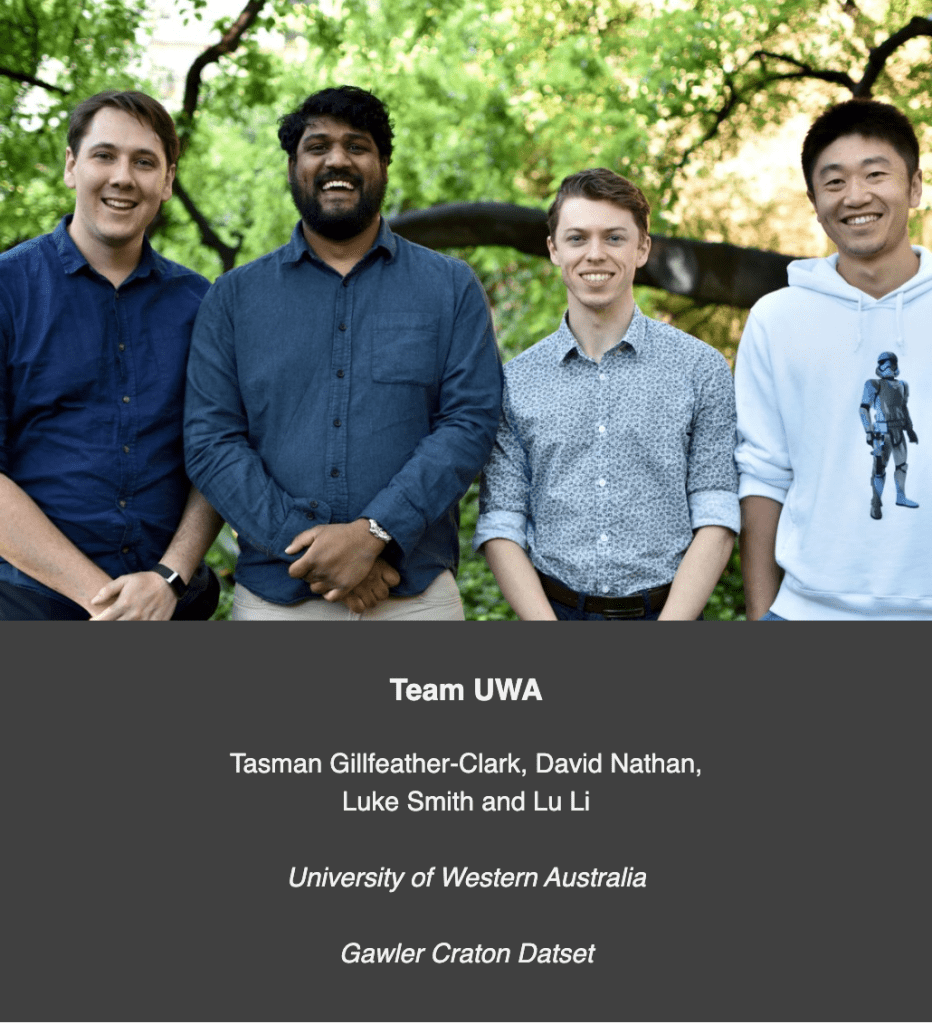
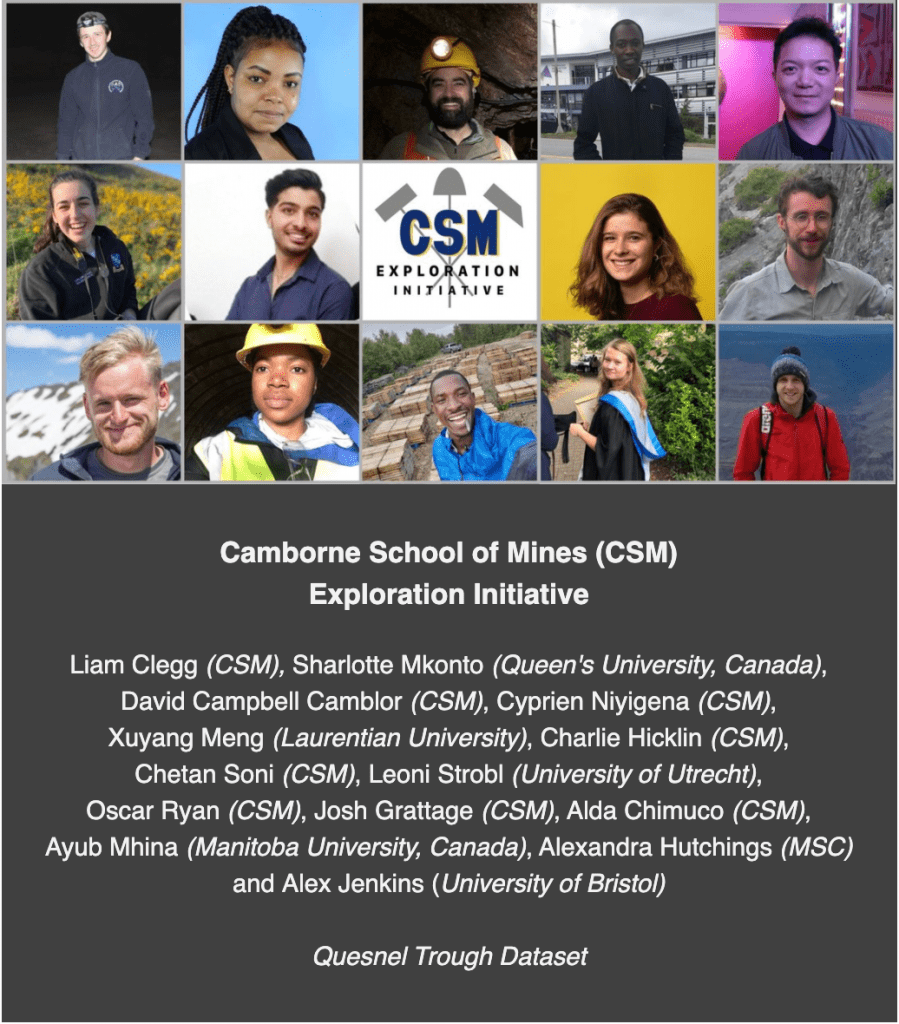
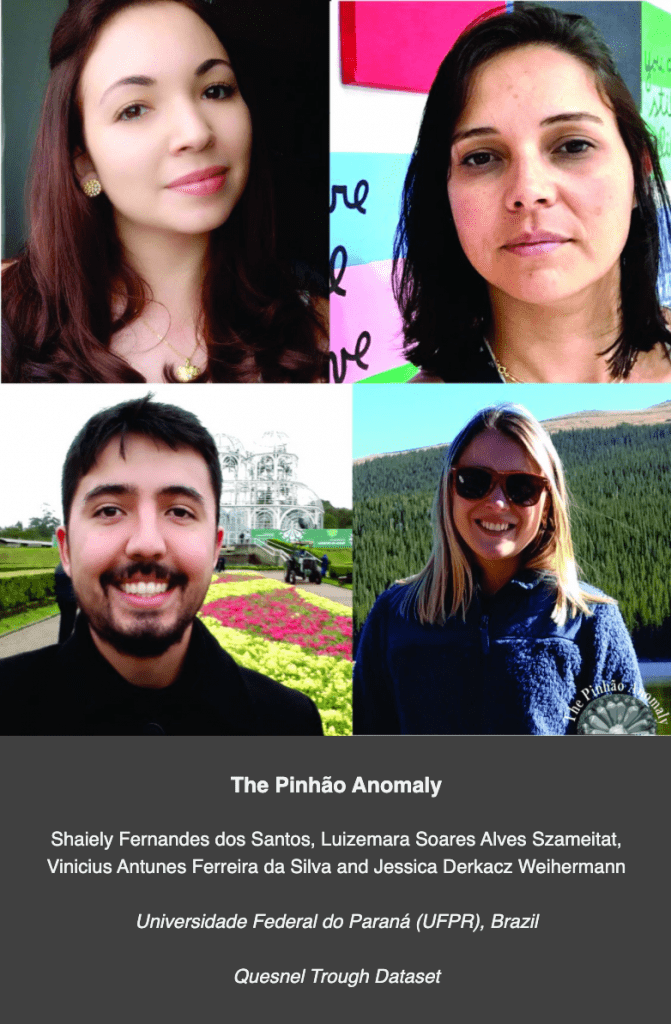
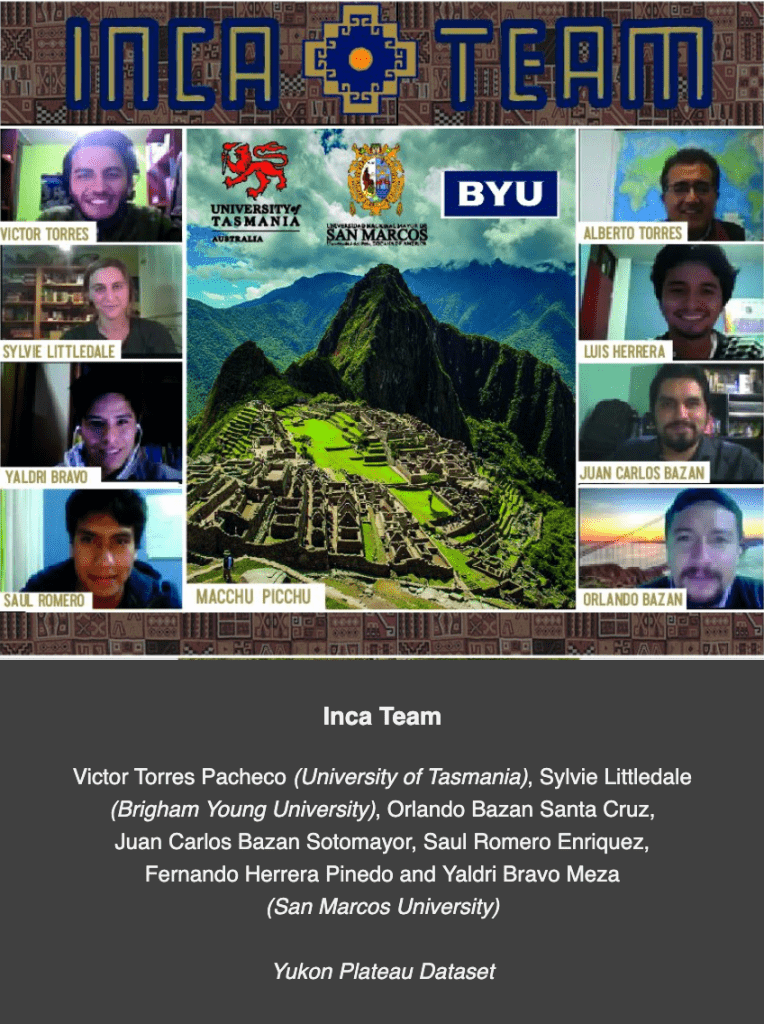
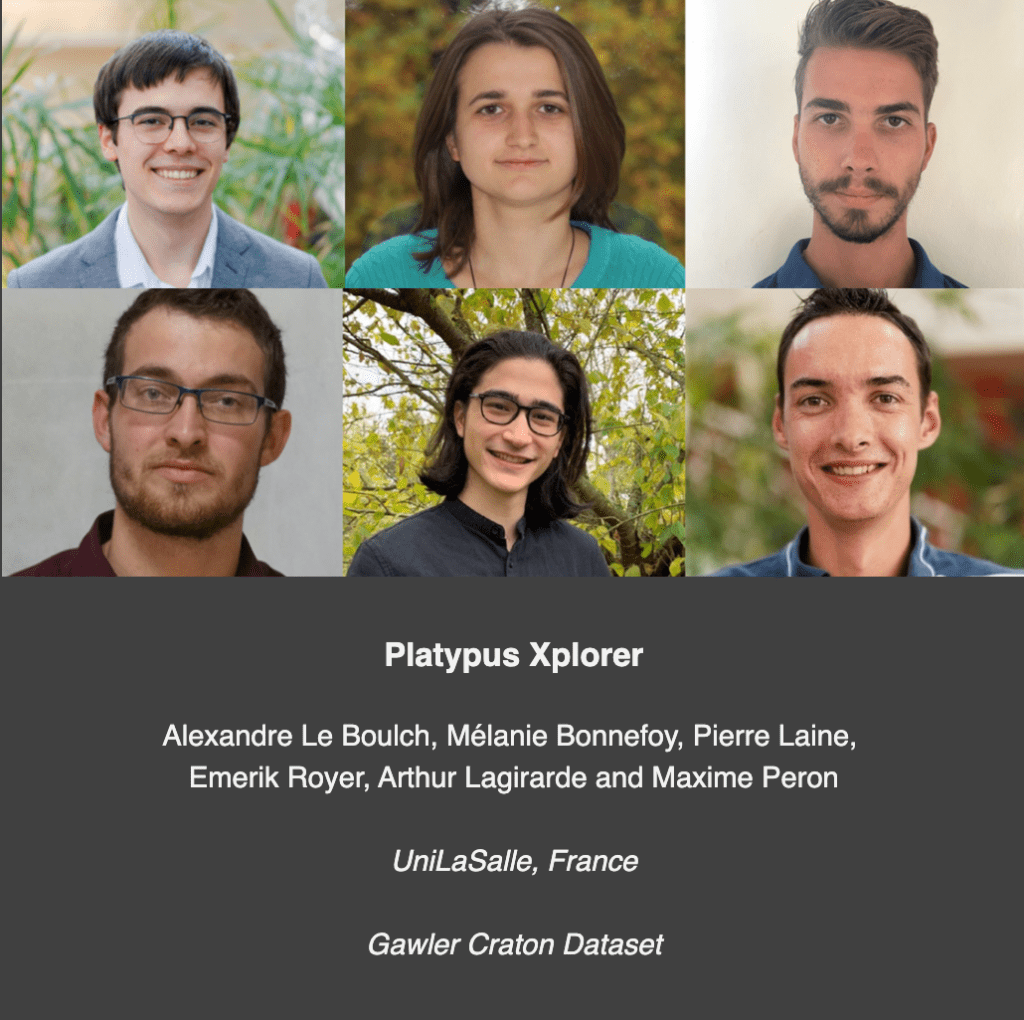
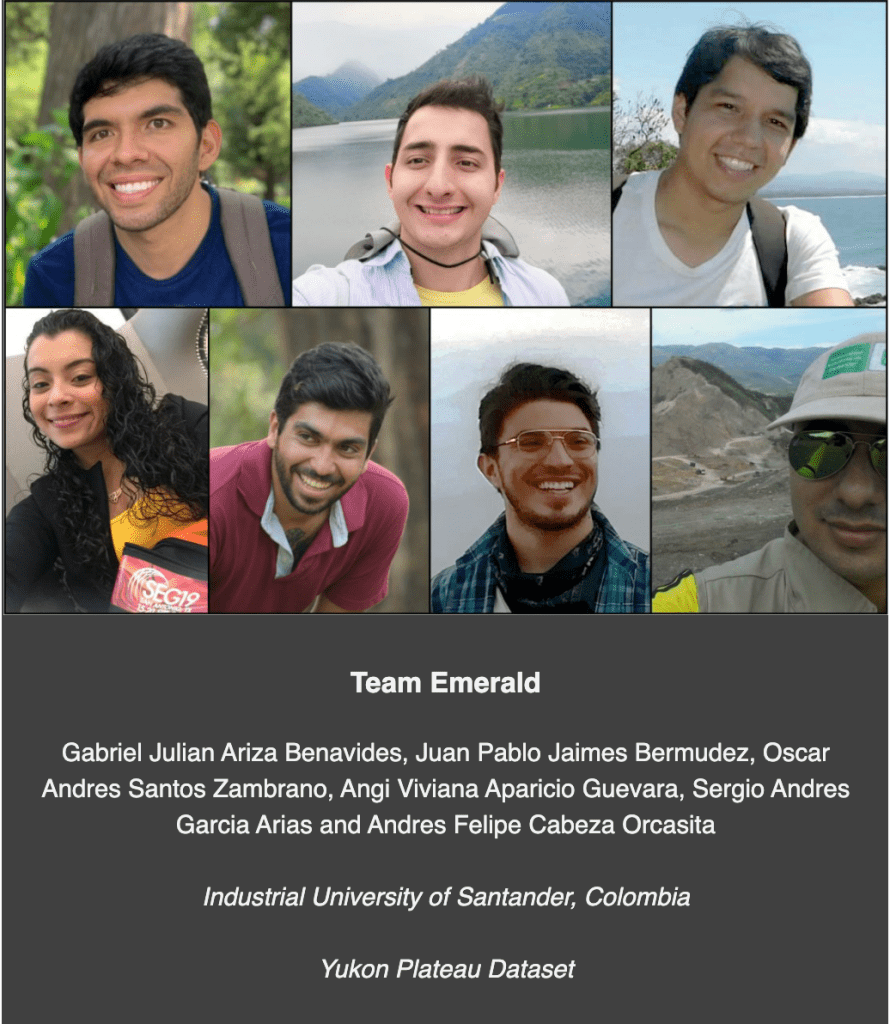
There will be two 1-hour NGEA™ events at the virtual PDAC convention. The first will feature the six finalist presentations and the second event will be an interview and panel discussion with our judges and the teams.
Finalist Presentations: Tuesday, March 9, 11:30 am – 12:30 pm EST (GMT-5)
Judges’ Interview: Wednesday, March 10, 4:00 pm – 5:00 pm EST (GMT-5)
The Australian Institute of Geoscientists is seeking expressions of interest from geologists and other professionals who may be interested in documenting their personal experiences at the Argyle diamond deposit or with the Kimberley diamond search of the 70s and 80s leading up to its discovery.
The submissions (including photographs) will be compiled into a compendium and published by the AIG and sold through the AIG bookshop.
This follows a compilation of personal experiences at the Ok Tedi copper-gold deposit in Papua New Guinea which has since been published by the AIG. It is envisaged that the 50th Anniversary Commemorative Volume of the Discovery of the Mt Fubilan Copper-Gold Porphyry, Ok Tedi, Papua New Guinea will serve as a template and guide for prospective authors for the proposed Argyle volume.
Expressions of interest should be emailed to Mike Erceg (michael.erceg219@gmail.com), Andrew Waltho (andrewwaltho@me.com) or Grant Boxer (boxerg@iinet.net.au)
We had an excellent first meeting for 2021 on Friday 5 February, 2021!
Thanks to everyone who joined us, to those who presented and to those who enthusiastically participated in the many discussions, you are all such a valued part of the AUGEN TEAM!
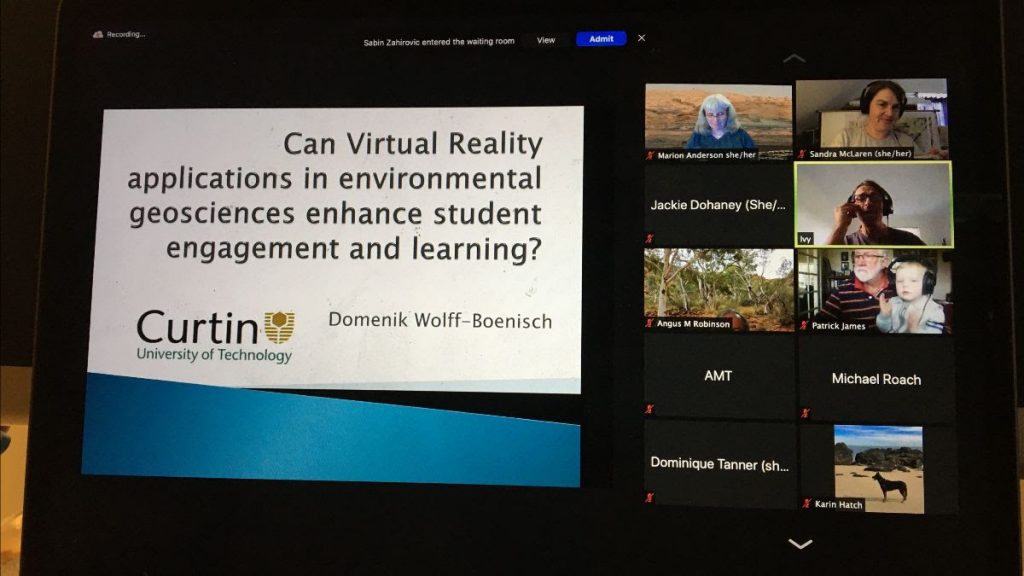
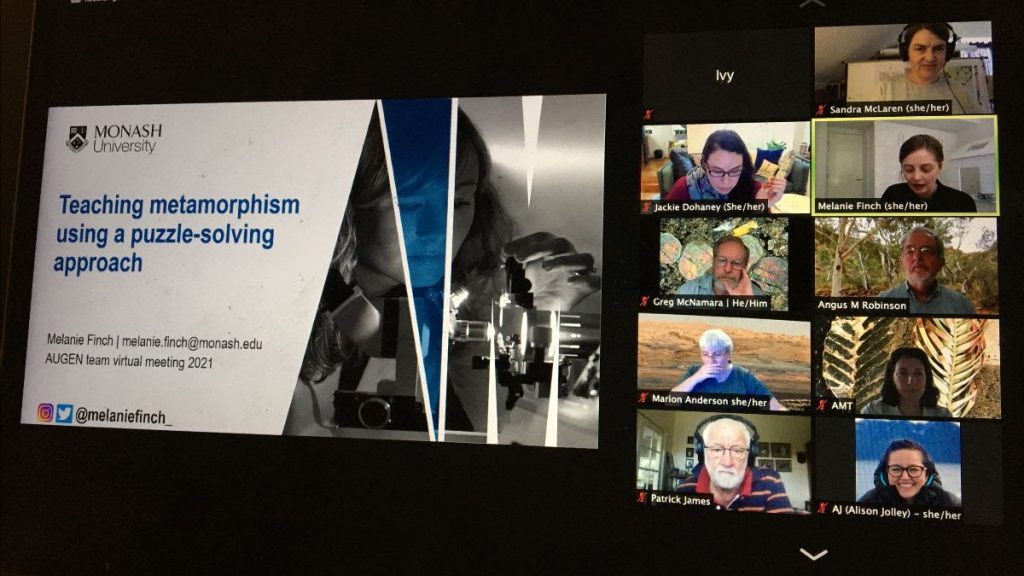
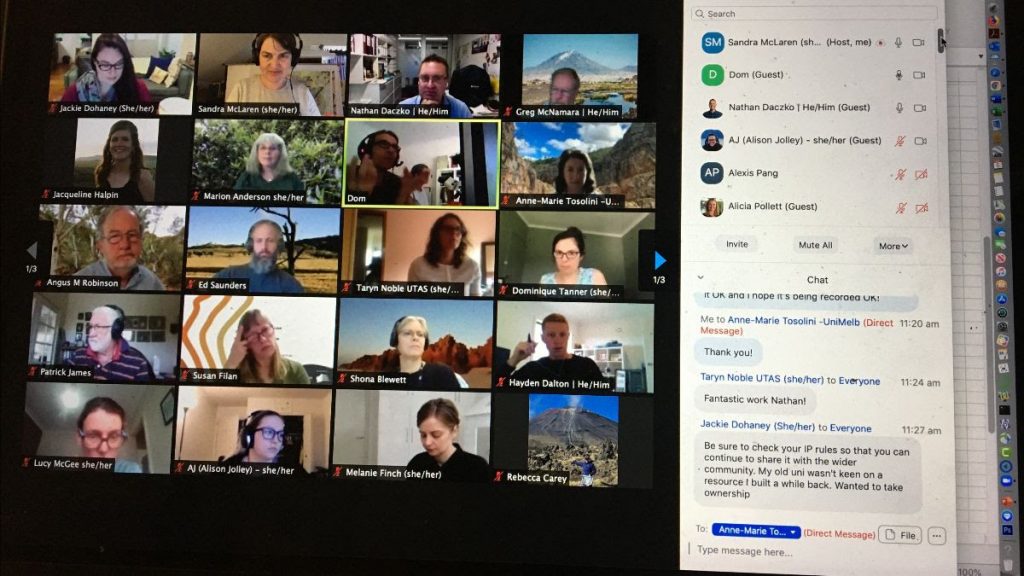
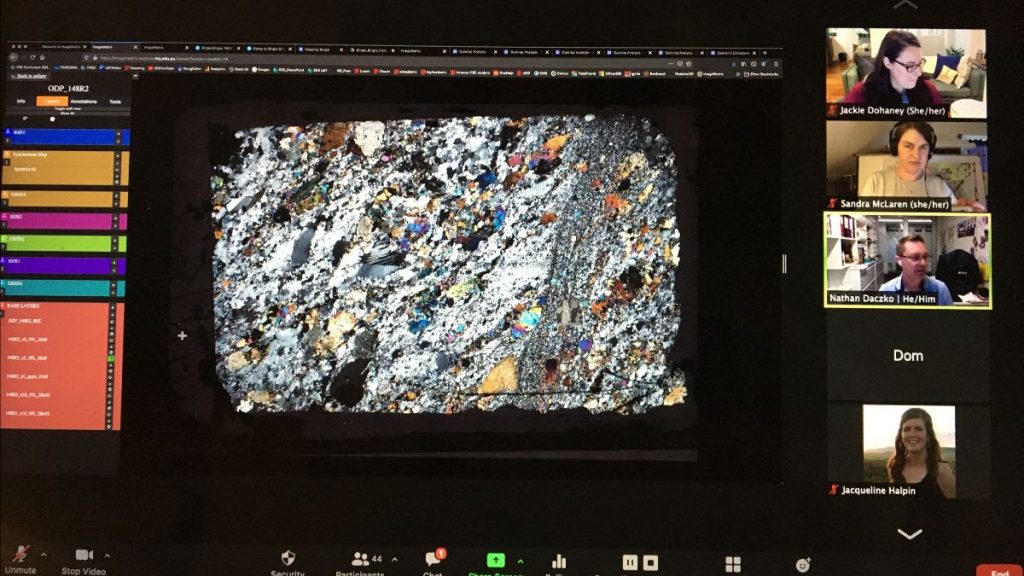
The recording of the whole event, the chat transcript and slides from several presentations are now available on the AUGEN TEAM website:
https://www.augenteam.net/virtual-meeting-2021
The AUGEN TEAM
Australia’s geoscientists benefitted from a sharp increase in employment opportunities in the final quarter of 2020 according to the latest AIG Australian geoscientist employment survey.
Unemployment amongst professional geoscientists (geologists, geophysicists and allied Earth scientists) recommenced a downward trend after improvement in employment prospects stalled throughout the previous three quarters of the year.
AIG President, Andrew Waltho, welcomed the results. “It’s great to see job prospects for Australian geoscientists ending what had been a tentative 2020 on such a positive note” he said.
Nationally, between the beginning of October and end of December 2020, geoscientist unemployment fell sharply from 10.6% to 4.5%, the fourth-lowest rate recorded since the survey series commenced in June 2009 and the lowest rate recorded since June 2012, at the height of the resources boom. Under-employment amongst self-employed geoscientists also fell in the final quarter of 2020, from 12.7% to 9.3%.
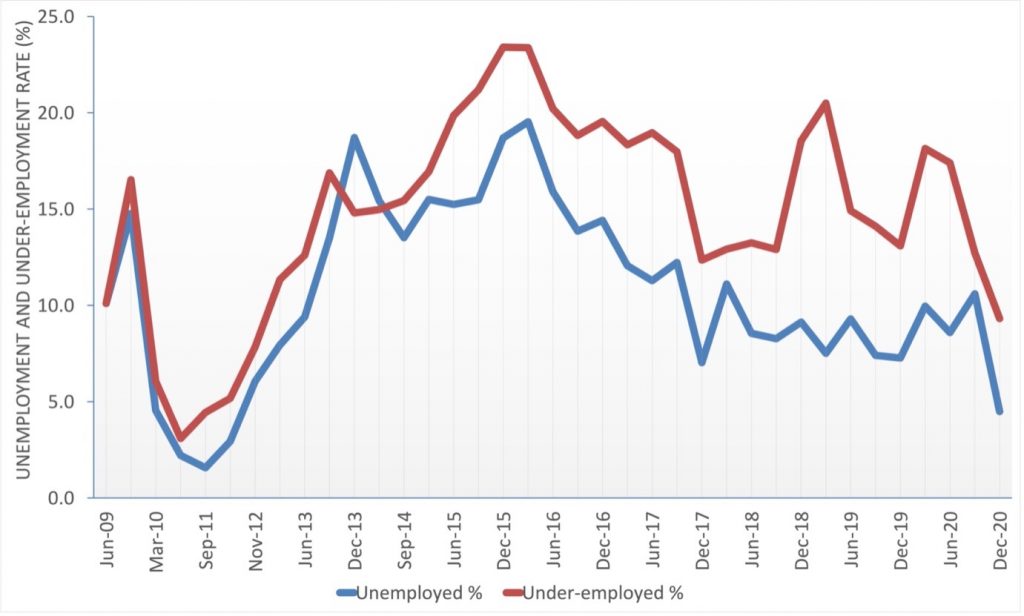
Employment improved across Australia. The greatest improvement was evident in Western Australia where unemployment fell from 8.0% to 2.6%. In Queensland, the unemployment rate fell from 9.4% to 5.3%, while a more modest fall was recorded in New South Wales, from 5.0% to 3.8%. Geoscientists working in Victoria continued to have the worst employment prospects, although unemployment fell from 24% to 15.4% at the end of the quarter. Only a small number of survey contributions were received from South Australia, Tasmania and the Northern Territory.
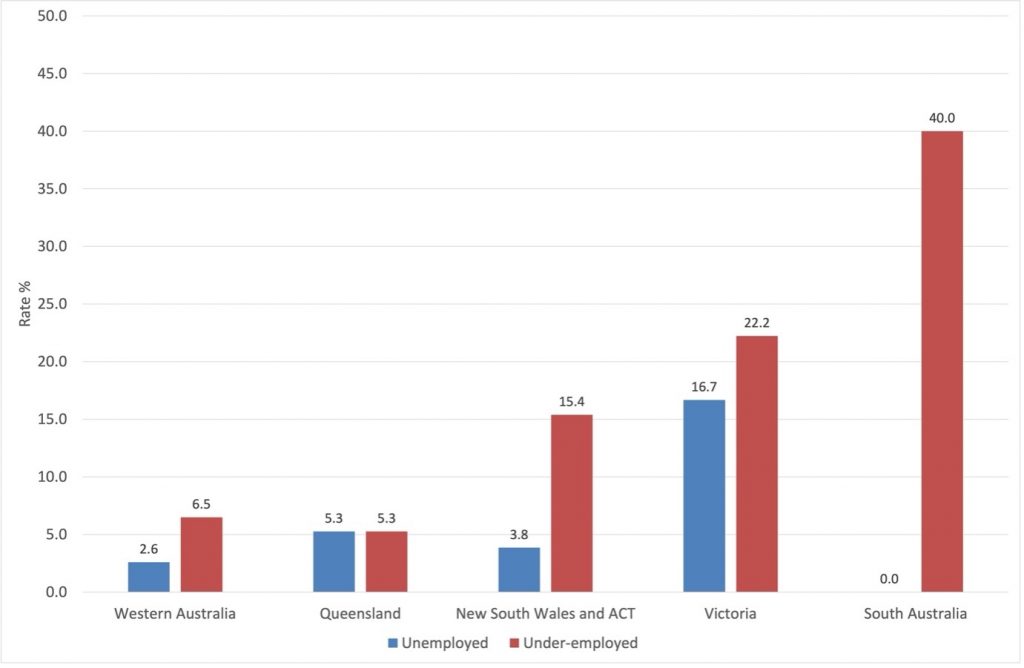
Mineral exploration delivered the bulk of new employment opportunities, with the proportion of geoscientists engaged in the field increasing from 61.5% to 69.2% during the quarter. Employment in minerals production also increased slightly from 14.6% to 15.3%. The proportion of geoscientists engaged in energy resource exploration and production decreased from 6.3% to 3.1% for the same period.
The proportions of geoscientists in different forms of employment (full-time, part-time, casual and self-employment) remained essentially unchanged.
The proportion of geoscientists seeking employment outside their profession fell from 9.1% in the third quarter of 2020 to 2.4% in the latest survey results, as geoscientists embraced better employment prospects.
Improved confidence was evident amongst unemployed respondents, with almost half of the unemployed and under-employed respondents feeling confident of returning to work within six months. Long-term unemployment, however, remains a concern with almost half of the unemployed respondents reporting having been without work for more than 12 months.
The vast majority of geoscientists in work at the end of December felt confident of retaining employment for the next 12 months. More than 9 in 10 geoscientists in employment reported that their conditions had been maintained or improved over the previous 12 months, since December 2019.
Gender diversity remained unchanged with women comprising only 14% of geoscientists employed in all sectors of industry, government, education and research across Australia. This figure has not moved significantly since the survey began collecting gender information in December 2017.
The survey received 337 responses, a strong response for the December quarter surveys.
“The latest quarterly survey revealed some very positive results” Mr Waltho said. “An improvement in employment for geoscientists was expected during the fourth quarter of 2020 from discussions with colleagues and peers, but the magnitude of the improvement was a surprise” he said. “The increased confidence evident in employment prospects is great to see, and although long term unemployment remains a feature of the geoscientist employment landscape, the number of geoscientists affected has decreased significantly for the first quarter in some time” he said.
“The employment improvement appears to be largely due to increased mineral exploration” Mr Waltho said. “I would expect that the Australian exploration expenditure statistics for the quarter will reveal increased exploration activity, especially in Western Australia and Queensland, when they are released by the Australian Bureau of Statistics” he said. “Strong metals prices appear to be driving renewed investment in resource discovery, especially in commodities like gold, copper, nickel and other battery materials, even lithium where 2020 was not a good year for producers and investors” he said.
“A major concern is that Australia’s geoscience community is aging” Mr Waltho said. “Almost 40% of geoscientists in Australia have been working for more than 30 years, placing them in their mid-50s, while early career geoscientists: those with less than 10 years experience comprise less than 10% of the community” Mr Waltho said. “We are again looking at a situation where there are too few, appropriately educated and skilled students coming through Australian universities to meet future demand, as experienced geoscientists retire” he said. “This is a real concern, as a similar issue is evident in many developed countries including Canada, USA and across Europe, which raises real concerns as to how demand for geoscientific skills in all sectors of industry will be addressed” he said.
“We only have five to ten years to address this problem which is already front of mind for professional associations in Australia and overseas” Mr Waltho said.